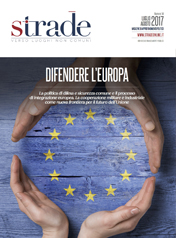What defence for what Europe?
Luglio/agosto 2017 / Monografica
We cannot hope for an effective European defence if we don’t believe in Europe itself. The competences, methods and areas of action where European defence can compete with other blocks must be accurately defined and if possible, this should be done before the next emergency. A European white paper on defence is the starting point.

In the context of post-World War Two Europe, a European conception of defense has gradually gained ground over national approaches. Initially, this new conception had two goals: on the one hand, avoiding new intra-European wars, and on the other exploiting the union as a means to address the weakness of the European States against the threat of the Red Army. But since Europe remained organized into independent countries, this new approach posed a dilemma for the States themselves that were caught between the need to join forces across Europe and across the Atlantic, and the need to retain their complete sovereignty in matters of defense.
The abortive attempt to create a European Defense Community in 1954 was the first sign of this dilemma, which continues to this day in the domain of security, where nationalist parties fully exploit it to urge for a withdrawal that will ostensibly restore their lost complete sovereignty. It is also responsible for the many frustrations that European citizens have felt with respect to the credibility of a European defense that they nevertheless ardently call for (according to Eurobarometer surveys).
Resolving this dilemma should therefore be our main goal if we want to improve the defense of our countries. And this naturally implies an evaluation of two parallel issues: the evolution of Europe's political organization and that of its defense: What type of defense structure is appropriate for which configuration of Europe? The ideas that follow begin with an analysis of the question of sovereignty in defense, then briefly evaluate current intergovernmental cooperation, and finally propose a way of more efficiently Europeanizing defense.
1. National sovereignty and defense:
Defense is a State's sovereign responsibility and cannot easily be separated from the notion of strength. What is sovereignty without strength when a State must protect its interests in a world where States are ever more interdependent yet continue to compete with one another, thereby appealing to strength? The world of the twenty-first century is one of continent-States (China, Russia, United States, India, Brazil, etc.) that are more powerful than any European State.
For this reason, European States have only one set of alternatives: either choose their alliances case by case, according to the circumstances and contingencies, or join forces during peacetime in order to attain a level of strength that is sufficient to protect their interests, preserve their influence and stave off domination.
Military power remains an indispensable element of strength, but today, in Europe, only France and the United Kingdom (with some reservations, given its dependence upon the United States) are in a position to single-handedly defend their vital interests – thanks to their nuclear arsenals – and still have the ability to initiate limited coercive operations outside their borders. But for how long? All the other European States must act in a multinational framework where they play a complementary, if not frankly subordinate, role.
For most European States, the expression of their sovereignty in defense essentially amounts to the choice of which power they wish to be dependent upon and which coalitions they wish to, can and must be a part of. And the prospects of evolution in the global relations of force in the decades to come show no signs of improvement for Europe.
So a pressing issue for Europe involves voluntarily sharing sovereignty in the area of defense as a way to increase strength. We need only look closely at the current situation of European defense to see this.
2. Assessment and limitations of the current (intergovernmental) cooperation within NATO and the EU:
Within NATO, the European States delegate the responsibility for the bulk of their defense to the United States. Even though decisions on planning and operational engagement are made by consensus of all the allied States (where each State has one vote), the military power of the US gives it a dominant position and decisive weight with respect to areas, types and level of engagement, as well as to the modes of action. The European States are completely dependent upon American policies and strategy and therefore do not truly take on their defense responsibilities.
The success of NATO's interventions is enlightening in this regard since it has always been a result of American military strength and the "leadership" that is associated with it: in Bosnia, as in Kosovo and Afghanistan, the United States bore political responsibility and provided 75-80% of the men and arms. The 2011 intervention in Libya showed how difficult it is for Europeans to act within the NATO framework when the Americans who hold the highest positions within the structure of command (SACEUR, COMAFSOUTH) take on only a supporting role in an operation led by others. This situation runs the risk of dividing American and European security interests in Europe, even if only partially, and the declarations of the new American president create legitimate fears about the US's commitment to European security and the costs associated with it.
The situation within the European Union is no better. The EU, in which Member States have been developing common interests for some time, is the natural framework of choice for consolidating forces, but it must not hamper them, which has been the case up to now. At the heart of the PSDC’s current way of functioning, there is a deep conflict that must be resolved between the need that the European Heads of State have expressed of joining their forces in order to attain necessary critical strength, and their desire to maintain complete freedom of decision-making and action at the national level. This conflict is the real cause of the gap between the voluntaristic declarations of the European Council and the facts. It is a key political problem that cannot be resolved purely through technical measures.
With the excuse of not overlapping with NATO, the aspirations of the PESD (which became the PSDC after the Treaty of Lisbon) were thus limited from its inception in December 2000 and have only been slightly modified since. The EU permits itself only civilian and military operations in situations of crisis outside its borders; it has no permanent operational command structures (beyond the EUMS at the political-military level), and in fact considers only limited, low-intensity operations.
In support of the new Global Strategy for European Security approved in 2016 by the European Council, the High Representative nevertheless stresses that:
"...Our Union needs a shared strategy and vision that are acted upon jointly…"
On balance, the current method of intergovernmental cooperation is not satisfying. Within NATO, it leads to total dependence upon the United States and therefore to uncertainty; in the EU, it leads to paralysis and operational inefficiency (the crises in Libya, Mali and the Central African Republic amply demonstrate this), but also to inefficiency in matters of capability, where gaps are as widespread as overlapping capabilities. While Europe's need to consolidate its forces in order to better defend itself turns out to be more necessary and pressing than ever in the domain of security, we have not yet found the paths toward efficient Europeanization of defense.
3. How can we Europeanize defense?
The goal of any true European consolidation of defense resources must be to allow the States involved to attain a capability for defense and action that is greater than what they could hope for as single nations. The union of their powers must have a multiplying effect on their strength. But this option rests on the voluntary adhesion of the States, which must accept a common form of management in order to benefit from the increased strength.
The ambition and realism of this goal obviously depend on what the consolidation looks like at the political and operational levels.
- In the political domain, the goals may be stated as: common and complementary interests, shared risks that are accepted by all, and efficient political leadership.
- In the military domain, the goals are: efficient European structures of command, adequate capabilities and operational modes of action, and interoperable forces that have been trained to work together.
In order to improve the current system, it is indispensable to go beyond the form of intergovernmental cooperation in use in the EU, whereby each decision-making body (Councils, COREPER, COPS, etc.) functions based on the intersection of very different - often contradictory – national interests, with very different priorities according to the States' geographical position, size and history, and which arrives at the lowest common denominator (especially when twenty-seven or twenty-eight countries are involved).
In order to define Europe's true interests and act effectively at this level, it is indispensable to consider Europe (the EU) as a political entity that must be defended as such, including the protection and defense of its Member States. That is why a top-down study of the defense needs and priorities of this group (500 million inhabitants, living in the same geographical space with its borders, and producing over 20% of the world's GDP), must be carried out as a European white paper on defense that will add to the results from national analyses and provide a coherent, complementary framework. That is the non-negotiable starting point for an effective European defense.
Only this type of approach will allow us to fix the paralysis, the divisions and current gaps by promoting advances in three key areas: merging the security interests of Member States, bringing together operational cultures and developing the credibility of "European leadership".
- Merging security interests: a European white paper should contain an analysis of the potential security risks and challenges threatening the EU on its borders, the best answers at the European level, an outline of the necessary capabilities, as well as the channels for appropriate political decision-making and operational execution. It would allow us to define the highest European interests corresponding to the EU's physical and political realities, which include and supersede national interests. An assessment of the conceivable answers to the threats and challenges at each level (European, national and regional) could be made, including measures for consistency among the three levels. In such a way, European and national security interests would be tied together, opening up a path to a degree of complementarity among national defenses, and to their mutual strengthening, which would foster greater solidarity among the Member States of the EU and remind Europeans of their common destiny.
It would also allow for better predicting the EU's possible political and operational responses to existing and potential threats to the EU, a more equitable distribution of defensive efforts, a more balanced division of the costs of intervention in crises, but also for clarifying the areas in which mutual assistance would be necessary. This global European defense approach would give meaning to the enhanced cooperation of States regionally and across States, and to the actions undertaken by a limited number of States acting in the EU's name against certain threats (Article 44 of the Treaty of Lisbon). By making use of permanent structured cooperation, it could even begin with a limited number of countries.
- Secondly, preparing responses at the European level would promote the consolidation of operational cultures. Today, despite the interoperability of European soldiers and their experience working together, especially within the integrated General Staffs of NATO, operational cultures remain separated among countries whose ambitions and modes of action differ. A collective analysis of the planned needs and responses at the European level would bring the cultures together and, with them, operational logic. This is the first step towards a spirit of European defense. It would promote consolidation by reinforcing cooperation and gradually developing incorporation, beginning with non-combatant functions such as education, logistics, support, etc.
- A European white paper would finally help a visible, credible political and operational "leadership" at the European level to emerge.
By recognizing their defense needs across the continent, along with several remedies, Europeans would create the conditions for their own strategic autonomy as well as a certain European unity of action. In order to speed up political decision-making (which was cripplingly slow in the most recent crises), we must be able to count on both the ability to anticipate situations and the decision -making process.
Informed decisions should make use of studies of potential crisis scenarios that come out of the analyses in the “European white paper” and they should anticipate responses at the European level as a function of the parameters authorized by all the Member States, as well as the type of contribution that each State foresees. This does not mean that States will make decisions before-hand, but that they will consider the probability of engagement with respect to pre-established situations. Moreover, this would promote raising the PESC's level of ambition and would stimulate the development of the necessary capabilities. Such an approach would naturally imply that the EU treat its defense globally, i.e. seamlessly between threats that are external and internal to Europe, and establish a complete, permanent chain of command.
This evolution would respect the interests of the States by boosting their autonomous defense capabilities in exchange for their acceptance of a shared, common framework. It would reinforce our transatlantic partnership by making the EU seem like a credible security force capable of acting both independently and alongside its allies. This approach to europeanizing defense would open the way for greater integration while also respecting the States' sovereign prerogatives. It would allow us to overcome the current obstacles caused by the simple intersection of divergent national interests.
Another element of these measures should be to correctly inform the citizens across the whole of the EU who will have to recognize their legitimacy. This means informing them about how a European-wide defense would better protect them at the cost of solidarity, rather than dazzle them with expectations of European defense without the means to achieve those expectations. We can only hope to create an efficient European defense if we believe in Europe!
INDICE Luglio/agosto 2017
Editoriale
Monografica
- Le politiche spaziali, l’internazionalizzazione e l’integrazione dell’Ue
- Europa della difesa? Costa meno e ci rende più sicuri
- Investire in sicurezza: il fondo Ue per la difesa
- Common defence and security, the return of politics
- Defence as a currency, a European sovereignty
- Europe, time to unite forces
- Difesa e sicurezza comune, la rivincita della politica
- A possible EU army under current treaties
- La difesa come la moneta, una sovranità europea
- What defence for what Europe?
- Europa, è il momento di unire le forze
- Space policies, economic internationalization and EU integration
- Un esercito comune e comunitario. L’europeizzazione possibile a trattati vigenti
- A United Europe for Defence? Increased safety and lower costs
- Quale difesa per quale Europa?
- Investing in security: the European Fund for Defence









